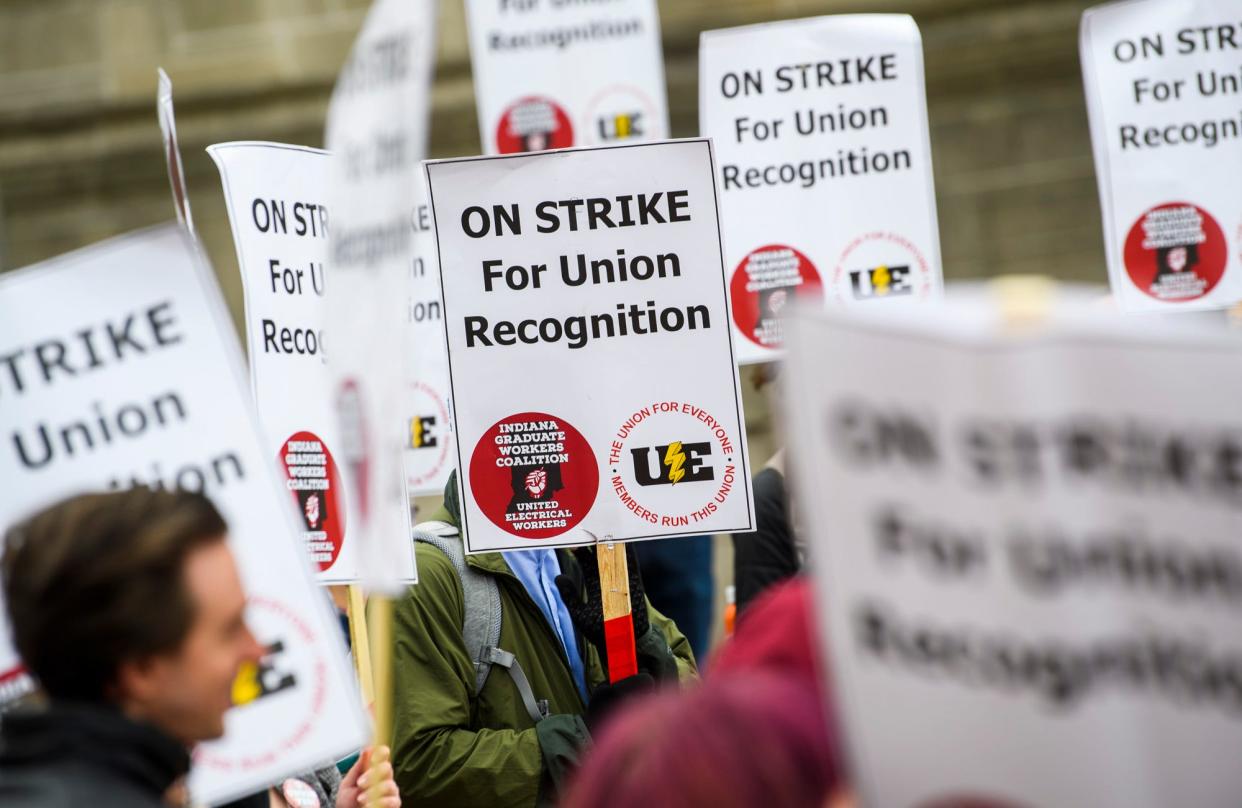Indiana University graduate workers vote against fall strike. Is the labor dispute over?

The threat of a work stoppage has loomed heavy over Indiana University's Bloomington campus for the past several months, leaving students and faculty alike worried over how campus might continue to operate without support from its graduate workforce. However, the prominent graduate student labor coalition let up on some of its pressure for a chance at renewed dialogue with the IU administration.
More:Indiana University's grad student labor coalition urges members against striking
In April, many student graduate workers went on a labor strike for four weeks, requesting union recognition from the IU administration in addition to expanded benefits, higher wages and fee waivers.
This weekend, members of the Indiana Graduate Workers Coalition weighed in on whether to resume the labor strike they had suspended in the spring. A vote to strike would have meant hundreds of graduate workers, including many who teach classes, ceased working on campus. As IU Bloomington Provost Rahul Shrivastav wrote, a work stoppage could cause IU's undergraduate population to "face major academic disruptions, financial implications and other significant ramifications."
IGWC members overwhelmingly decided against a strike with a 91% voting majority. A number of key factors likely contributed.
Since the labor dispute reached an apex early this year, IU has responded with changes directly mirroring IGWC's platform of demands. The university significantly increased the minimum stipend and promised to have a periodic analysis of wages to ensure IU keeps pace with other Big Ten universities. Mandatory university and program-related fees, including the additional fee international graduate workers had to pay, now are covered by the university. The administration also has promised to expand graduate workers' health and wellness policies and grievance pathways.
What is 'shared governance'?Indiana University's faculty, administrators, students debate
Despite campaigning for the strike's renewal, the IGWC leadership discouraged members from supporting another strike the day before voting opened. Since graduate student representation on campus is slated to expand, IGWC leaders said they are in open talks with campus representatives about a pathway toward union recognition on various boards and committees.
Is IU Bloomington's graduate labor dispute now over?
The IGWC leadership affirmed the coalition’s overarching goal of union recognition. Entering a dialogue with campus representatives seems to be the best pathway rather than a labor strike, according to coalition leaders.
“Over the next few months, (coordinating committee) members and union representatives will continue meeting with deans and department chairs to formalize the local role of the union rep, so it becomes standard practice for grads to be able to request the presence of a union rep in meetings related to our labor,” IGWC said in a news release.
IGWC members voted to suspend the spring strike after receiving major support by Bloomington faculty members, expressed during the first all-faculty meeting in nearly two decades.
This time, the IGWC hopes to secure union recognition by holding seats on new and pre-existing committees. Recently, the administration expanded graduate student representation through two committees. The Graduate Student Advisory Committee is a new group that will meet regularly with the graduate school dean and provost. It is described as a neutral environment where graduate students can raise issues and discuss solutions to improve their experience. President Pamela Whitten and Provost Shrivastav also supported Bloomington Faculty Council re-establishing the Student Academic Appointee Affairs Committee.
The administration has not publicly shared further details about who will serve on these committees, but IGWC representatives said they are working with the BFC and the Graduate and Professional Student Government to gain representation on campus.
“We've seen from (the BFC) a willingness, at least from a large number of council members, to work in good faith with us towards union recognition,” IGWC member Nora Weber said.
While still not in agreement about union recognition, university leaders have echoed the idea that IU's work to improve the graduate student experience is still far from finished.
"On each of the primary concerns raised by student advocates, we’ve been able to make substantive improvements and meaningful progress — yet our work is far from complete. Additional working groups will lead to action on subjects ranging from healthcare, diversity, equity and inclusion, career and professional development, and more," Shrivastav wrote in a recent column.
These working groups are overseen by the Task Force on Graduate Education, which was created by Shrivastav as a response to mounting criticism by graduate students about their working conditions.
While there is no strike happening this week, that isn't to say striking again is completely out of the question. In addition to the strike vote, IGWC members gave approval in an 88% majority vote to authorize its coordinating committee to set a new strike date in the future if negotiations with campus representatives fail.
This article originally appeared on The Herald-Times: Indiana University grad workers vote against fall strike

